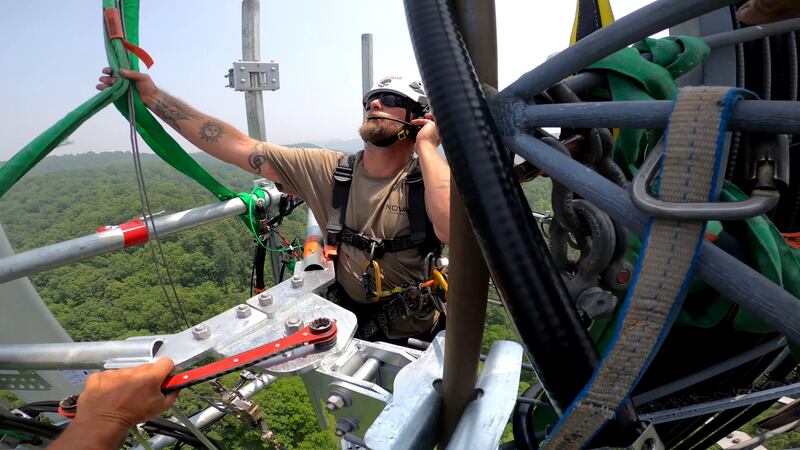Scattered across the country’s skylines are tens of thousands of towers dedicated to providing signals for cellphones that people rely on every day. One Crystal Lake man is raising awareness of what he says is a lack of safety protections for the people who climb those towers to ensure cellphone service stays intact.
Tommy Schuch launched the nonprofit Climber Protection Group on July 1 as a way for tower climbers across the country to join forces to advocate for better safety and protection standards in the industry.
Cell tower climbers are a niche group of workers with about 20,000 in the country who repair, upgrade and maintain transmitter systems such as antennas that are responsible for providing service to cellphones across the country. As of 2022, there were more than 142,000 operating cell towers in the country, according to the Wireless Infrastructure Association.
Those climbers endure extreme heights, weather and long hours. Schuch himself worked as a climber for about 12 years and has climbed hundreds of feet in the air at night and through snowstorms all around the country.
Over those years, “I witnessed a lot of accidents,” he said. “There’s a big lack of accountability within the industry in regards to safety regulations.”
The Prairie Grove-based organization’s mission is to provide education, reporting and public awareness to shine a light on the industry dangers while pushing for change. The group offers free membership for climbers to anonymously report job hazards and unsafe conditions.
“No climber should ever be forced to choose between getting the job done and making it home alive,” Schuch said in a Climber Protection Group news release. “We are committed to raising awareness and sharing real stories from the field and working toward a safer and more transparent industry.”
Schuch also owns Tommy Schuch Media, a production company behind multiple investigative documentaries exposing the dangers in the industry, including “The Life of the Tower Climber II: Failures at Every Level.”
:quality(70)/cloudfront-us-east-1.images.arcpublishing.com/shawmedia/DDDPJHGVQNDNFFLE2DOS53LPNA.jpeg)
Schuch listed more than 170 deaths from 2003 to 2024 in his documentary, many of which were falls. According to an Occupational Safety and Health Administration report, there were 107 incidents from 2003 to 2013 with 91 fatalities. Out of the total deaths, 79 were from falls.
Kansas-based Doug Delaney is a 25-year tower climbing veteran and a contributing writer for the Climber Protection Group. Schuch discovered Delaney through his book, “Tower Dog: Life Inside the Deadliest Job in America.”
The Climber Protection Group is “the first real attempt at trying to unite the rank-and-file in a safe place that I’ve ever seen,” Delaney said. “There’ve been organizations out there in the past that purported to be on behest of the climber, but they never really were. They turned out to be trade organizations on behest of the carriers and the contractors.”
Delaney said he would like to see a union that protects the climbers and provides better wages.
Tower climbers typically start at $17 to $22 an hour, with foremen receiving an average of $30 to $40 an hour, Schuch said.
The little wages are a result of the many layers of contractors and subcontracts who scrape away at the money, leaving the leftovers to the climbers, Delaney said. Even less money is left for upgrading safety equipment.
“For every one tower worker, there’s 200 to 300 people making a living off his labor,” Delaney said. “All the way up the chain. It’s obscenely bloated in middle management.”
Shaw Media reached out to three different industry groups that represent the businesses behind cellphone towers. None responded to requests for comment.
Delaney said he has inspected hundreds of towers in his career. Inspections are required by law, but no laws, as far as he knows, require companies to actually fix the towers. Delaney has seen ladders and cables hundreds of feet in the air secured with only a screwdriver and even a dog leash, he said in a Tommy Schuch Media video titled “The Truth About Tower Climbing: Inside a Broken Industry.”
Along with board members Richard Bell and Bridgette Hester, Schuch’s goal for the group is to gather all climbers in one safe space to get everyone on the same page. In the future, the group may push for legislation and work with OSHA to increase safety standards. But he knows it could be difficult with the money and lobbying power that major cellphone carriers have.
For a shorter-term goal, the group aims to become a tax-exempt 501(c)(3) nonprofit organization, Schuch said.
The effort to organize tower climbers may be a difficult task because of their typically individualistic nature, plus the small labor force is scattered around the country, Delaney said.
“Never before has so little of a labor force affected everybody in the country’s daily life from the time they wake up to when they go to bed,” he said. “They’re totally unknown and under-appreciated and they’re definitely not paid enough.”
:quality(70)/cloudfront-us-east-1.images.arcpublishing.com/shawmedia/VCAPVU2CFNFBZONQFPROZZPPPU.png)
In the “current political environment,” Delaney said he doesn’t see any legislative changes happening anytime soon. But possibly in the future, with an administration that is “more in tune with labor and the working middle class.”
“All I want people to do is recognize there’s a blood price to be able to text to pick up some milk,” he said. “No technology since fire has changed the world as much as the cellphone.”
More information can be found at the group’s website at climberprotectiongroup.org.
